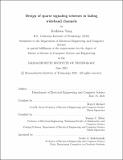Design of sparse signaling schemes in fading wideband channels
Author(s)
Yang, Kathleen
DownloadThesis PDF (1005.Kb)
Advisor
Médard, Muriel
Eldar, Yonina C.
Terms of use
Metadata
Show full item recordAbstract
The shift to the wideband regime due to the crowded frequency spectrum has resulted in a requirement for a different modulation scheme from previously used modulation schemes in order to succeed. Impulsive frequency shift keying, which is frequency shift keying with a duty cycle, is one such signaling scheme that has been shown to perform better than code division multiple access and orthogonal frequency di-vision multiplexing in the wideband regime without channel state information, but lacks practicality due to its maximum likelihood noncoherent receiver being a bank of frequency-selective filters. In this work, we first explore using a chipping sequence-based compressed sensing receiver, which is simpler and more practical than a bank of frequency-selective filters, to recover impulsive frequency shift keying signals. We show that when the number of chipping sequences is equivalent to the number of frequency-selective filters, the performance of the two receivers are similar. In addition to exploring a sequence-based receiver for impulsive frequency shift keying, we also make alterations to the modulation scheme. We develop the wideband time frequency coding scheme, which incorporates frequency shift keying with pulse position modulation, and show that the capacity of wideband time frequency coding is greater than impulsive frequency shift keying when the duty cycles are equivalent. As wideband time frequency coding is very similar to impulsive frequency shift keying, we also investigate the performance of a chipping sequence-based compressed sensing receiver to recover its signals.
Date issued
2021-06Department
Massachusetts Institute of Technology. Department of Electrical Engineering and Computer SciencePublisher
Massachusetts Institute of Technology